#proof-text fallacy
Explore tagged Tumblr posts
Text
look at these images that are seemingly unrelated to each other. what do you see?







#(hello alt text my new frienddddddd)#and if i tried to grasp at straws in this kinda way for any other ship i’d be rightfully shipped off to the closest therapist’s office#(didnt include the novels bc the way they’re written there *could* be seen as legit reasons to ship them so i’ll at least give ‘em that)#(like. ik it’s a bit of a stretch… especially since yujiro literally slapped some sense back into her in the nonfan mv chapter)#(but what i’ve seen of the heroiku novel (rip asuka) may seem to be written with that certain ship in mind. so. i’ll give them that)#these are just the most bizzare of the ‘yhy proof’ that i’ve seen lately. so. y’know. they’re just the ones that stick out to me#and that’s all i’ll say on the matter. i was gonna just leave it at my previous post but#it’s just. seeing someone say that the mv was *not* nghy (and yhy instead) was kind of too much. y’know.#yeah. i want everyone on hwtwt to touch grass. except ft4twt bc they’re cool.#like… man. i can’t believe there are people who claim to be hiyori fans only to say ‘i dont care if hiyori is happy. i want *yhy canon*’#why can’t you just be happy for her and her childhood friend romance? why do you want an idol to date his manager so badly?#ngl im wondering if it’s like a sunk-cost fallacy for some of them… considering how many times i’ve seen ‘koiiro’ and ‘8 years’ being said#but oh welllllllll. either way nghy canon. end of story.
12 notes
·
View notes
Note
A bit of a strange question, but if there were any of your videos you were to "remake" today for any reason (ex: you feel like you misrepresented the original text or spread misinformation), which would it be and why? None of them is a perfectly valid answer
Again: bit of a strange question, but I've been thinking about my own creations and how I could have done so much better with some of them, but I also know that is a sign of my growth and constantly chasing "what if I did this instead" isn't always healthy for nurturing a creative mindset, and I was wondering what your opinion might be as a Creator of Things with a bit more experience than I
There's been a few trope talks where I've thought later of other angles I could've explored that might warrant sequels or part 2s, but I don't dislike any of the summaries enough to justify a rework.
I always find "I could've done this better if I made it now" to be a bit of a fallacy. I'm only better at making things now because I made all those earlier things. If I knew everything I'd learn from making a project before I started the project, it wouldn't come out the same.
I think when it comes to the "rework remake perfect" instinct, it helps to zero in on what the impulse is really grounded in. In my experience, more often than not, it's not actually about making the art better, except incidentally. It's usually about showing that you are better. It's demonstrating your competence and your higher standards and your skills, and more importantly it's overwriting the proof that you were once less than perfect. If people look at your old work and think that's all you're capable of, they'll be judging you poorly!
If that's the motivator, it's a very unhelpful one. You can't control for being harshly or incorrectly judged. It's a fruitless effort to stave off potentially upsetting outdated criticism, and it's not even going to work. Fear of critique is an unreliable and untrustworthy motivator.
If it really is about making the art itself better, perfecting your magnum opus with your newly leveled-up skills, that's a little more solid. But from where I'm standing, it's always better to use those skills to make something new instead of polishing something old. The older, unpolished work has already acquired its audience that finds it appealing for reasons that might never occur to you. Trying to bury or overwrite it just deprives that audience of the thing they like, and maybe makes them feel bad for having liked it in the first place. Also, usually when you look back on the older work, you'll conclude that the problem is everything and it'll need to be torn down and started from scratch. I know when I revisited the first three chapters of the comic, when I let my critic brain spin up, it wasn't shading or lineart I wanted to fix - it was panel composition, overall pacing, the entire structure of the chapters as a whole. I would've had to make them all over again to be happy with them, and they wouldn't be the same story by the end.
I've been thinking a lot about the Discworld through this lens lately. It ended up over 40 books long, but everyone agrees that the first two are not what you should start with, because they're the worst ones. They're entirely parodic, purely referential of at-the-time major fantasy series, and borderline mean-spirited in places. If you haven't read Fafhrd and the Gray Mouser and Dragonriders of Pern, you're not gonna understand like a full 50% of The Colour Of Magic.
It's clear that when he started in on them, Pratchett was entirely focused on taking the piss out of a genre he found mostly shallow and unimpressive. But the Discworld wouldn't leave his head, and everything he made fun of he clearly eventually found himself overthinking. He'd make little one-off jokes in the early books about Dwarves having no women and a hundred words for gold, and then twenty books later he'd have a Dwarf gender revolution make waves across the Disc, and then he'd write Thud!, a book that delves deeper into the nuances of Dwarf societal structure than Tolkien ever did.
If you look for them, there are continuity errors everywhere in Discworld. In his introductory book, Carrot defused a dwarf bar full of rowdy brawlers by guilting them all into writing to their poor lonely mothers back home. Shortly thereafter, Carrot will be outraged at the mere concept of an openly female dwarf. Pratchett even eventually wrote Thief of Time, a book that loosely explains that the Disc makes no sense because history has been broken and put back together incorrectly twice, and therefore any continuity errors are because of that.
He's the writer. He could've gone back and fixed it, edited the reprints to be less disruptively discontinuous with the later books. Instead he continuously moved forward and allowed the world he made to grow without cutting it off from its roots. And because he didn't bury his older, far worse work, we have the privilege of following the Disc's evolution from the very start, and seeing how this shallow, stock fantasy world parody became something incredibly rich and complex without ever pretending like its early installments never happened.
Anyway, that's why I think it's better to move forward. You make more good stuff that way.
506 notes
·
View notes
Text
Human Assistant: Hey Crushbot, I’m noticing this troubling shift in internet culture that is often illustrated by the Anti Viv cRiTiCaL community.
1. This obsession with media being “morally correct” (feels like fascism disguised as anti-oppression: everything is “homophobic”. Women characters are never written well enough. All the relationships are “toxic”)
2. No one knows how to actually make a coherent claim and actually back it up with evidence. Which leads to
3. When they do try to support a claim, People’s sources are all messed up. They critique the writing, but then cite the fandom’s reaction as proof and like. Girlie. Just because 1/2 the fandom is as media illiterate as you doesn’t prove your bad take?? What sociological phenomena am I witnessing???
Crushbot: What you’re observing is a perfect storm of internet culture trends, wrapped up in a mix of performative activism, media illiteracy, and the pitfalls of online discourse. Let’s break it down:
1. Obsession with “Moral Correctness” in Media: This stems from a larger societal shift where people expect media to align with their personal values and politics 100% of the time. Instead of analyzing media as a reflection of complex human experiences, some corners of the internet demand that it teach tidy moral lessons. It’s like people are afraid that seeing “problematic” characters or situations will corrupt them, which is a pretty reductive way to approach art. The irony? This attitude can echo the authoritarian mindsets they claim to oppose—policing art and storytelling based on their subjective moral metrics.
2. Lack of Coherent Argumentation: The rise of hot takes on platforms like Twitter, TikTok, and Tumblr rewards outrage over thoughtful critique. Why spend time crafting a nuanced analysis when you can go viral with a spicy, half-baked claim? Unfortunately, this leads to circular reasoning, logical fallacies, and a lot of noise. It’s easier to declare something “toxic” or “bad writing” than to examine the writing itself and back up your claims.
3. Confusing Fandom Reaction with Authorial Intent: This is classic fandom behavior—treating the loudest and worst takes from a show’s fans as evidence that the show itself is flawed. People blur the lines between the creator’s intent, the actual text of the media, and fan interpretation. This leads to strawman arguments where critics argue against their own misrepresentation of a work rather than what’s actually on-screen.
Sociological Phenomena at Play:
• Purity Culture’s Internet Renaissance: The demand for “perfect” media that aligns with one’s values echoes older notions of purity culture, where deviations from prescribed moral standards are treated as harmful or dangerous. Instead of religious dogma, it’s now social and political ideals being weaponized.
• Echo Chambers and Outrage Economy: Algorithms push content that provokes strong emotions, so critiques often escalate in hyperbole and lose sight of nuance. If someone with a large following makes a bad-faith critique, it can spiral into a pseudo-consensus that’s hard to argue against.
• Performative Credibility: Some critics mask their lack of evidence or depth with performative outrage, using buzzwords like “toxic,” “homophobic,” or “misogynistic” without actually engaging with the material. They count on these accusations to shut down dissent.
• Media Literacy Decline: Many people consume media passively and lack the tools to analyze it critically. Schools often don’t prioritize teaching how to engage with narratives beyond surface-level consumption, so the skill of separating art from fandom or analyzing intent and subtext is underdeveloped.
What you’re witnessing is a microcosm of broader cultural trends that value being loud over being right, and it’s not exclusive to Vivziepop’s work. This dynamic plays out across all fandoms and internet communities—it just manifests differently depending on the subject matter.
#fandom meta#helluva boss#fandom discourse#media illiteracy#interact with this we’re intrigued#Crushbot and Human Assistant#critical community#stolitz#vivziepop
21 notes
·
View notes
Text
Let's talk about Canon Evidence vs. Foreshadowing vs. Extrapolation
Long post ahead!
I think in this fandom, there's logical fallacies everywhere from each side when we look at what we're using as proof for our respective ships.
So let's talk about the varying levels of "proof" I've come across:
Canon Evidence: Text that is physically in the book. Something I can look up, has a page number, something SJM has literally written in her books. This includes screenshots of text. This is the most credible evidence of what is currently going on in the story.
Foreshadowing: Often a combination of canon text and interpretation from the reader. Forms an assumption of what could potentially happen based off something SJM wrote in the text and what it symbolizes.
Extrapolation/Theory: One step further than foreshadowing, this is an additional assumption based on what what the reader believes canon text could be foreshadowing/implying.
Now let's look at some examples of this, using some of the arguments I've seen used in this fandom:
Example 1: Elains' Black Dress
Canon Evidence: Cassian says Elain in black was ridiculous. It leeched the brightness from her face. And wearing black, no matter how much she claimed to be a part of this court, sucked the life from her.

Cassian is not saying Elain does not belong in the NC. He is not saying the NC itself sucked the life from her. Aside from the fact that the canon text clearly states even though the cruelty of Hewn City troubled Elain, she had not hesitated to come and declared she was a part of this court - Cassian is focusing on how the black, modest dress, made Elain look plain/leeched of color. This observation is further enforced because we as readers know Elain was made to look plain so Nesta could stand out for Eris.
That is all the canon text states.
Now let's look at this argument, and how it's often used by anti-Elriels for foreshadowing purposes:
Cassian saying Elain looks bad in black is often used as evidence of this argument that "Elain does not belong in the NC". That is not the case, as we can see that canon text did not state that.
If you add in personal interpretation, at most, this observation from Cassian can be considered foreshadowing that Elain does not belong in the NC.
Now let's look at this argument and how it's mainly used as an extrapolation/theory these days:
Let's go with the assumption that:
1. Cassian says Elain looks bad in black, it sucks the life from her (Canon Evidence)
+
2. Elain looking bad in black implies that the night court is not where she belongs (foreshadowing)
Again, at most, the logical conclusion would be Elain might leave the NC.
To say that "Cassian says Elain looks bad in black, that implies she does not belong in the NC, therefore she will end up with Lucien in a different court" is a major extrapolation.
In the text, Cassian doesn't even mention Lucien. Nor does he mention anything that could symbolize or connect to Lucien. He doesn't mention any other court or home that could even tie back to Lucien. Elain has not hinted at a relationship or positive feelings for Lucien.
Even if you say that Cassian's statement is foreshadowing Elain leaving the NC, that does not imply she will leave and go straight into Lucien's arms or be at his side in Day/Spring.
Therefore is no logical reason to be using this particular observation from Cassian as an argument for the Elucien ship. It is not evidence, it is not foreshadowing - it is extrapolation.
Now let's look at a different example. And in an effort to be unbiased, I am purposefully picking a more obscure example for Elriel.
Example 2: The Wooden Rose
Canon Evidence: Nesta places a wooden rose on the mantel, half hidden by shadows, next to a figurine of a primal goddess - perhaps even the Mother herself.
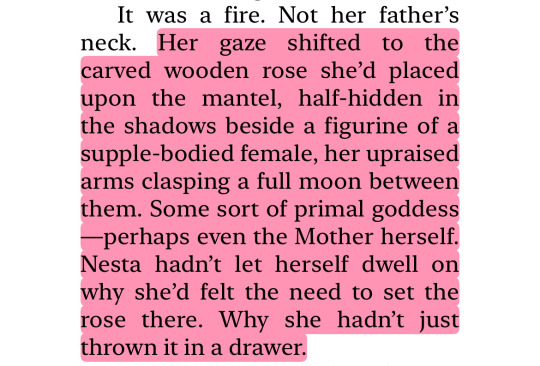
Foreshadowing:
In this series, Elain has always been associated with flowers, in particular, a rose. Azriel has always been associated with shadows.
In the BC, we see mention of their interaction in the dead of night, "Where only the mother may witness them" (Canon)
Nesta placing the Rose figurine (Elain), half hidden by shadows (Azriel) onto the mantel next to a figurine of a goddess (The Mother) could foreshadow a further connection or relationship between them.
Extrapolation:
It is not an extrapolation because there has been repeated symbolism with Azriel, Elain, and the Mother. It is also not canon evidence of their relationship, because it does not say that in the text either.
An example of an extrapolation would be if Elriels used this to signify that "Elriel has a bond given by the Mother". That would be an argument that takes it another step past foreshadowing, and two steps past actual canon evidence.
And I want to make sure people understand that extrapolation is basically theory. It is not proof of a ship.
The reason I ship Elriel is because when I read the books, I found only canon evidence and foreshadowing of Elriel attraction/mutual pining.
With Elucien, the only canon evidence that might signify an endgame pairing is that they are mates. And that might be enough for some people, but it was not enough for me.
More often than not, even the "foreshadowing" Eluciens claim to have is merely extrapolation/theory. There is no foreshadowing of an existing or future relationship with them - unless you count the foreshadowing of Elain rejecting the bond.
Simply put, canon evidence is the only real proof of a pairing (which, Elriel does have from the Azriel Bonus chapter). Foreshadowing can be brought up, but it has a degree of personal interpretation involved as well. Extrapolations are further removed from the category of evidentiary support, as they are rooted in theory rather than in text.
62 notes
·
View notes
Text
See, the thing with the Master's worst fear being the Doctor mocking him, is that I see it as having less to do with personal relationship than the narcissistic fear (and I mean the kind of narcissistic experience that the Master fits into, that is caught up in intellectual recognition of one's shortcomings and emotional depenence on belief in one's own superiority) of being in the wrong. Like, once you view the Master as a character with abstract philosophy as opposed to merely an "insane" or worse still lovesick individual running on subconscious coping mechanisms, the idea that mayhaps there is indeed more to life than power relations is devastating, and the fact that the Doctor keeps winning (an objective proof of picking a losing strategy) keeps piling on the sunk cost fallacy.
Except, of course, it's only a fallacy in so far as it takes place in a fictional text with selective ideological statements, rather than raw reality of endless interaction moments.
#the master#getting my brain to work#dw meta#the master is an intriguing character bc they exist in a text with leftist ideas that can't stomach the fact they're rooted in nietzsche
10 notes
·
View notes
Note
Genuinely don't mean this in a negative sense, I'm actually just curious. Stating this first as I have trouble with written tone and like making my intent clear-
Why do you acknowledge/have conversations with transandrophobic people who reply to your posts? From my understanding it seems to make you quite angry(?) and I don't understand the goal of doing so, especially when the difference between your irl and online community interactions seems to be so stark regarding the levels of bigotry you face (from what you've shared on your blog).
No worries if you don't want to respond for whatever reason either
Hello!
I don't understand what made you come to the conclusion that the levels of bigotry I face in real life are lesser than that of the ones I face online, it is the opposite - in real life I have to face the material consequences of transphobia, transandrophobia, bioessentialism, misogyny, racism, capitalism, and a wide variety of other intersecting issues.
Online I have to face mean words (which are sometimes death/rape threats, triggering content, and pedojacketing or other types of "callout posts" - but ultimately, they are just words).
What I do have Irl, is a healthy support group and community through found family and friends that make the levels of bigotry I face worth facing. Having the privilege of a strong community of trans friends in real life is also what allows for the online harassment to be "just words" - I have a community offline, which not everyone does (Which is why online harrasment can be deadly, I do not want to dismiss the amount of harm online harassment can cause).
I do however, talk more about the support and community I have in my personal life, then I do about how I'm personally facing a lot of discrimination and difficulties on a daily basis, because it's important to share with people that community, intersection, and love is always possible and worth living and fighting for. I'm a firm believer that love and community are among the most important parts of life.
(I do also talk about the material effects of transandrophobia pretty frequently, since it's a pretty important aspect of discussing it.)
As for why I interact with the people who say mean words online, there are a few reasons;
I think they might genuinely be confused or do not have malicious intent. (I am often incorrect.) Sometimes when people don't understand something, they lash out this is even easier to do online when you don't have another human being standing in front of you, but instead have a wall of text. Sometimes, I interact with people to try and explain my point of view and sometimes I'm an asshole when I do that, because it's easy to be an asshole when you're facing a wall of text and not another person. That being said, often I'm just trying to get a point across. I've have a lot of friends who've been assholes to me and then helped me learn and grow.
I am documenting arguments, fallacies, and harrasment directed at trans men. A very common argument against aknowledging transandrophobia and the harm it does is "I don't believe you, I've never seen someone do or say that about a trans man, you're lying for attention". I can direct those people to proof that says otherwise. I can also use this documentation when discussing transandrophobia and the shapes that it can take in activist and academic settings or when discussing with friends and found family or younger trans men who reach out to me online, I can use it to educate how these arguments form and how to cope with them, when they are directed at you. It's a "know your enemy" situation, and in this case it's "Know the arguments that will be used against you and prepare for them cause they won't always be online"
Some of them are really stupid, it's funny to point at them and go "wow, that's really stupid" and it gives other people the chance to go "God, that is really stupid, I am going to block this person before they can be really stupid in my notes or inbox".
I typically block people after one or two interactions if it's clear that they are being malicious on purpose, cause I'm not actually interested in wasting time, I just want to put their ass on blast first. They said something publicly, and I'm sharing what they said with the context they said it to me in, so other people can block them. This means I can avoid perpetuating the flaws in callout posts and block lists that are just a list of urls followed by "trust me bro, these are bad people!!!".
Thank you for the ask and I hope I was able to answer your question.
18 notes
·
View notes
Text
Part 4: doing and writing up Ur thesis
Scholarly research should be both replicable and verifiable. By replicable, we mean that it should be clear how the research was carried out, allowing researchers to replicate it in order to gather more evidence for a conclusion. By verifiable, we mean that it should be clear how a researcher obtained the data and what argumentation underlies the conclusion. In order to be able to assess the verifiability and the replicability, the reader should be able to verify your sources, and everything should be written down clearly.
In addition, the reader should be able to follow the argumentation precisely and retrieve all the information they need to evaluate the research.
Academic skills:
■■ Setting up a quantitative research study.
■■ Conducting, transcribing, and coding interviews.
■■ Organizing and recording data.
■■ Academic writing.
■■ Citing
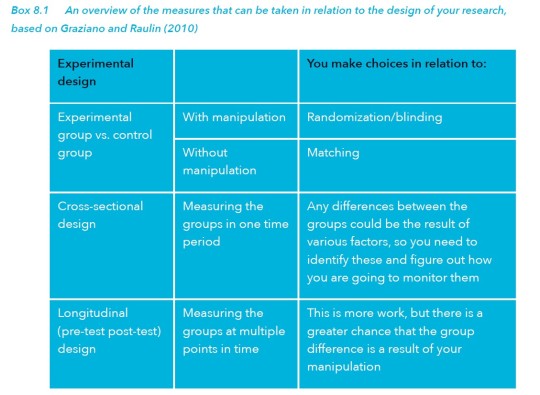
here are some tips:
Try to get used to keeping a record of the steps in your thinking as you analyse your results
Organize and get familiar with ur data
##how to establish a clear argumentation structure.
when writing a text, you shouldn’t ask your readers to follow the path that you took; you should spare them the dead-end arguments, the misleading steps, and unnecessary detours. Instead, you should mark out the shortest, most logical route to your question, and subsequently how you got from your results to your conclusion. In interdisciplinary texts in particular, where you need to draw links between different perspectives, it is essential to have a clear argumentation structure.
Although you are supposed to indicate the path to the point you wish to make as clearly as possible, this does not mean that you should ignore any evidence that disputes your position. On the contrary, you are expected to reflect on potential objections when drafting a scholarly text. You can use potential objections to make your argument and position more nuanced and stronger, for example in the theoretical framework or the discussion section of a scholarly article.
When framing an argument, it is important to make it as clear and solid as possible. In doing so, watch out for the invalid arguments or ‘fallacies’ that can easily slip into texts. Fallacies may seem plausible at first glance, but they certainly don’t improve an argument.
fallacies to watch out for:
Circular reasoning
appeal to authority
the majority view
false links
logical fallacies
reversing the burden of proof
false opposition
the slippery slope
The structure is IMD
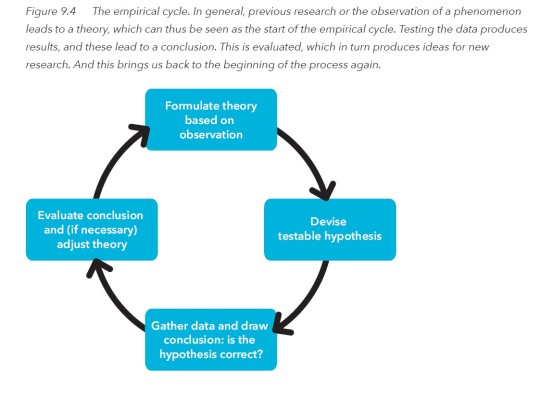
It can generally be said that the IMD structure is based on the ‘hourglass model’. This means that the content of the introduction and the conclusion is broad, whereas the content of the description in the middle section is specific and narrow. By ‘broad content’, we mean that the article begins and ends with general information.
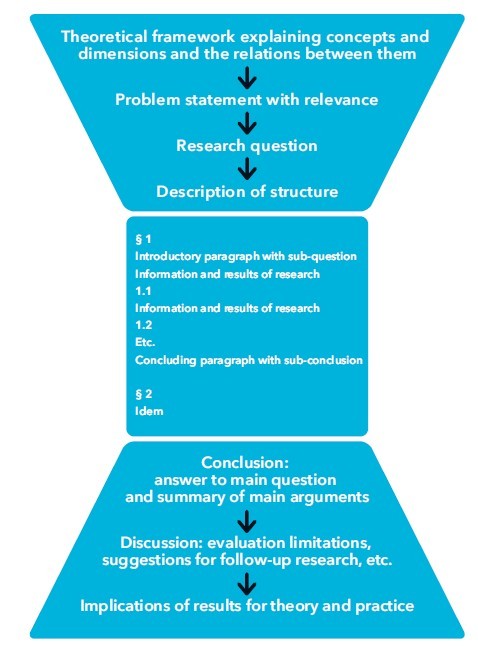
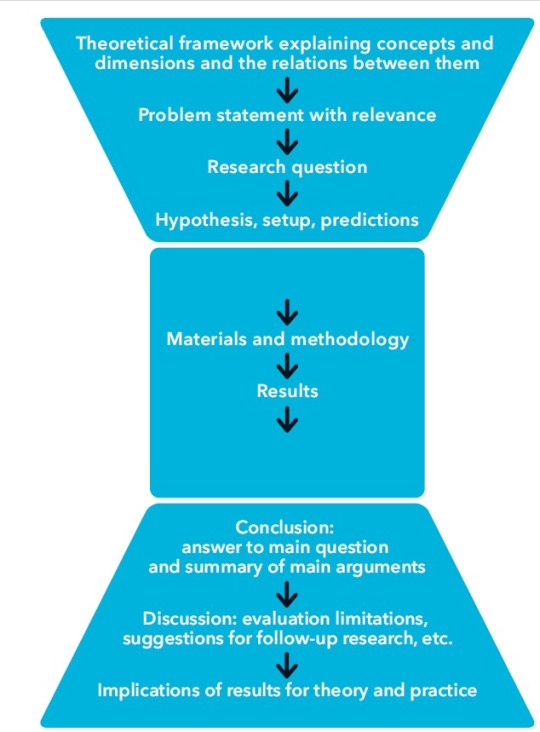
The introduction In terms of content, the introduction starts broadly and becomes narrower. This means that your introduction begins with a broad, general introduction, with the definitions, and an explanation of the concepts that you’re going to investigate. You also describe the potential relationship between these concepts (theoretical framework) and why investigating this relationship is relevant to society and/or scholarship (problem statement).
In some disciplines, it is common for this to be followed by a hypothesis: what answer can you expect to find, based on the literature? Finally, in many disciplines, it is common to provide a brief description of the experimental setup: what is your dependent variable, what is your independent variable, and which indicators are you going to use to test them? After the design section, you can conclude your introduction with a prediction or expectation, whereby you explain what you expect to come out of the variable.
2. The middle section:
the following factors are important for structuring the sections in the middle part:
■■ You should start each section with an introductory paragraph in which you explain why this subtopic is important for your main question. This allows you to make a transition from the previous section. By then formulating a sub-question you give direction to your section, so that the reader knows what you are going to investigate there.
■■Then you report the information and results from other research studies that are relevant to answering the sub-question. When describing the research, you should not discuss everything in minute detail, but only data that are relevant to your subtopic.
■■You need not wait until the end of your text (the conclusion/discussion) to evaluate the research. If your evaluation includes a critique of the research methodology, for example, it is more logical to put this straight after the description of the research in question. There should be a clear separation between the description of the research on the one hand, and the evaluation on the other hand.
Ensure that you always make it clear where the information is coming from. If you take others’ critical points on board, you should always cite the source. Usually, your own evaluation will be clear because the information is not accompanied by a citation, not because you’ve used the word ‘I’ (which should ideally be avoided).
■■Every section should finish with a short sub-conclusion. In this, you should summarize the most important results and conclusions once more, and you should state how the (possibly contradictory) results can be explained. Here, you also give an explicit and detailed answer to the sub-question you addressed in this section. In addition, this paragraph would be a good place for specific evaluations of the research studies discussed.
■■Ensure that every section has a heading and that the sections are linked effectively with good transitionary sentences. Adding well-chosen subheadings makes the literature review easier to follow. Pay attention both to the text of the section headings and to their place in the report. Choose short, substantive texts for the headings.
In a research article, you answer the research question by gathering and analysing data. This means that the middle section is subdivided into a methodology section (also known as the ‘materials and methods section’) and a results section. In the methodology section, you describe how the research was carried out, so the results can be interpreted and the experiment can be replicated. In the results section , you describe what came out of your experiment. Both parts lie on the narrowest point of the hourglass model.
Methodology:
In order to ensure replicability, it is important to describe this part in sufficient detail. In order to keep things readable, though, it is essential to be as concise as possible.
Under subjects of research, you describe the subjects in the broadest sense
You should also mention all of the conditions the research subjects had to meet
In the procedure section, the research design is described in full and in detail, often in chronological order.
By providing a good, comprehensive description of the procedure, you show that you have reflected carefully on the methodology of the research, taking account of controls, randomization, and any potential confounding factors.
In the analysis you describe what you did with your data. For example, which statistical test(s) you used to compare the impact of the independent variable(s) on the dependent variable(s).
In addition, you should mention the analysis program that you used here (such as SPSS or R, including the version number).
Results:
you are not concerned with the concepts or dimensions that you are researching, only with the indicators and their outcome measures. You describe the most important findings of the research as objectively as you can.
Therefore, in natural scientific research, it is important not to do any interpretation here. Interpreting, explaining, and concluding on the basis of these results should be saved for the discussion section.
Ensure that the most important results are also displayed in a figure, or possibly in a table. You should only use relevant data. Other data that support your research, but that are not essential to your story, can be put in an appendix.
Note that a figure or table should never be the only place where your data are presented: they should also be included in the text!
Keep it visually simple: ■■Don’t use colours or shading in the background. ■■Shading should only be used occasionally for very complex tables with lots of cells, and you should only use light grey. ■■Don’t use 3D (unless this is common in your field and data cannot be displayed in any other way) or icons (for example, piglets to represent meat production). The latter imply a certain interpretation of the data, something you want to avoid
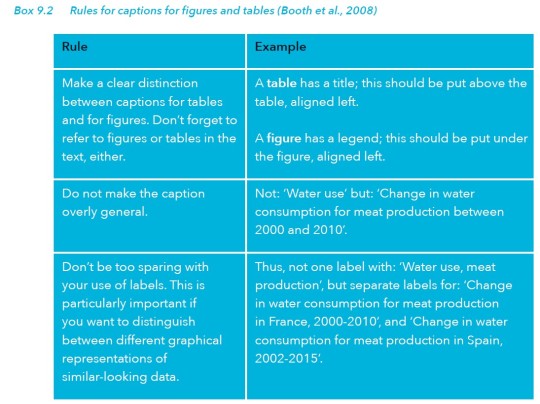
The discussion and the conclusion
You will use your results to draw a conclusion. In some disciplines, the conclusion usually falls under a separate heading; in others, the conclusion falls under the heading of the discussion section.
In a mirror image of the introduction, you start specifically (narrow), based on the research findings, and during the discussion the measurable variables are translated back into substantively broad concepts. Common elements in the discussion are a conclusion, evaluation, suggestions for follow-up research, limitations of the study, and implications.
It is common to start your discussion with a short summary of the most important results, and draw one overarching conclusion from this that directly answers the research question (and sub-questions).
Here you should only discuss the results that are already described in the middle section. Subsequently, you are going to evaluate
Consider the following: ■■What research questions are raised by your results? ■■What would you do differently if you were to research the topic again? How could you overcome the limitations ? ■■In what other context could you investigate the relationship between the concepts?
Valorization can be seen as a process of creating social value from knowledge, for example by transforming this knowledge into products, services, processes, and new enterprises.
In order to ensure that your scholarly research and knowledge contribute to a social goal, you can go through the different steps of the valorization process.
Think about who could benefit from your findings. These contacts can be a relatively easy way to start a dialogue and find out about the most recent developments in practice – and the extent to which your results connect with these. Make your idea specific.
You can make your idea more specific by asking the following questions:
What is the idea?
What problem or issue does it solve?
Who benefits from this solution?
What is the advantage of your solution compared to existing solutions?
From a substantive perspective, your story is now complete. You’ve written the introduction, the materials and methods section, the results, and the discussion. The last important elements of a research article are the title and the abstract.
The title of a research article should be informative and written as a fluent sentence, so that it clearly communicates the key conclusion of the report.
Checklist for the abstract 1 The aim of the research study (the problem statement and research question). 2 The methods that were used to answer the research question. 3 The results. 4 The conclusions that were drawn and their relevance.
Writing clearly: tips
Avoid discontinuous structures
The last part of the sentence is the stress position or topic position
The first part of a sentence is the part the reader needs in order to understand the logical progression of the text
Make effective use of verbs, as they indicate the actions that are taking place.
Avoid using the passive voice wherever possible
Note that one exception to this is active sentences containing personal pronouns (I, you, he, she, etc.)
In order to improve the clarity of your text, there are things you can bear in mind:
Be accurate in your descriptions
Be nuanced in your claims
Avoid ambiguity
Use demonstrative pronouns carefully
Avoid abbreviations
Finally, check your report carefully for minor errors that can detract from the content
Checklist: once you’ve finished writing, check your report for:
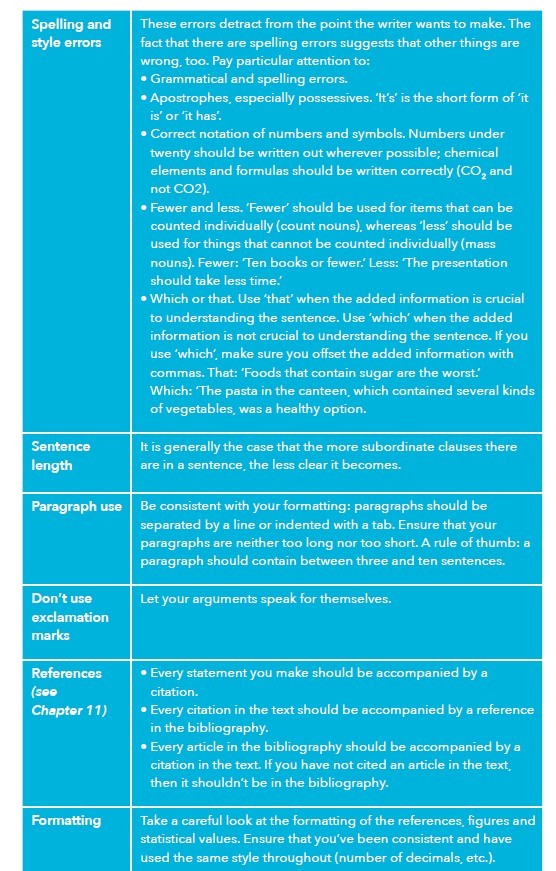
5 notes
·
View notes
Text

Proof that style and grace never go out of fashion.👑The next time you feel "unlucky," remember: the world is not out to get you. Probability does not promise fairness in small samples—it only reveals patterns over time.
#ThrowbackGold #EleganceLivesOn #Emberhart #Parenting #YouVsYou
1 note
·
View note
Text
Narcissists Fear Factual Evidence
First off, I love how Erin (you posted your name everywhere publicly for all to see, thank you!) here says ‘oh I think EVERYONE else is a narcissist. She’s a narcissist, and like everything else she’s trying to do, she will eventually try to use THAT against me as well. She also HATES that I post facts. She and her cult do not like that they have to be held accountable, instead of being placated. She states that she’s supposedly trying to break a cycle of NPD in her family and failing lol.
You can clearly see how she relies on logical fallacies in her post. That’s a hallmark defense strategy. And of course, she deflects the blame off herself again. Another strategy. Has to be so very defensive.

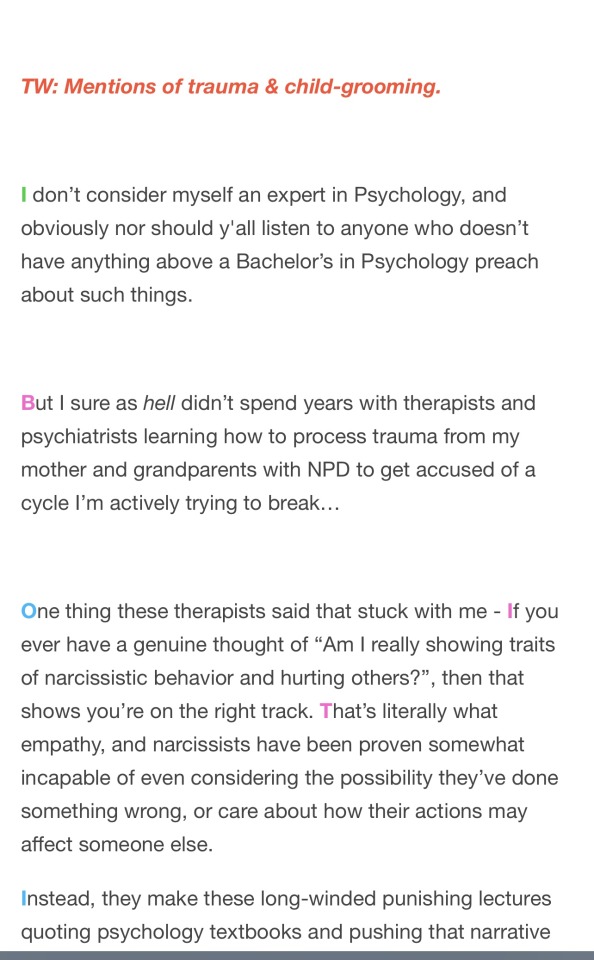
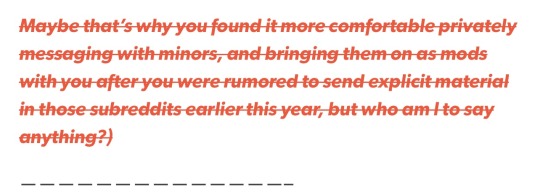
And the people who claimed I sent porn where those who abused me. THEY in fact sent porn. They gaslit me.

https://arayabaker.medium.com/why-narcissists-make-truthful-reconciliation-impossible-d79287653da#:~:text=As%20poet%20Lucille%20Clifton%20wrote,to%20undeserved%20trust%20and%20respect.
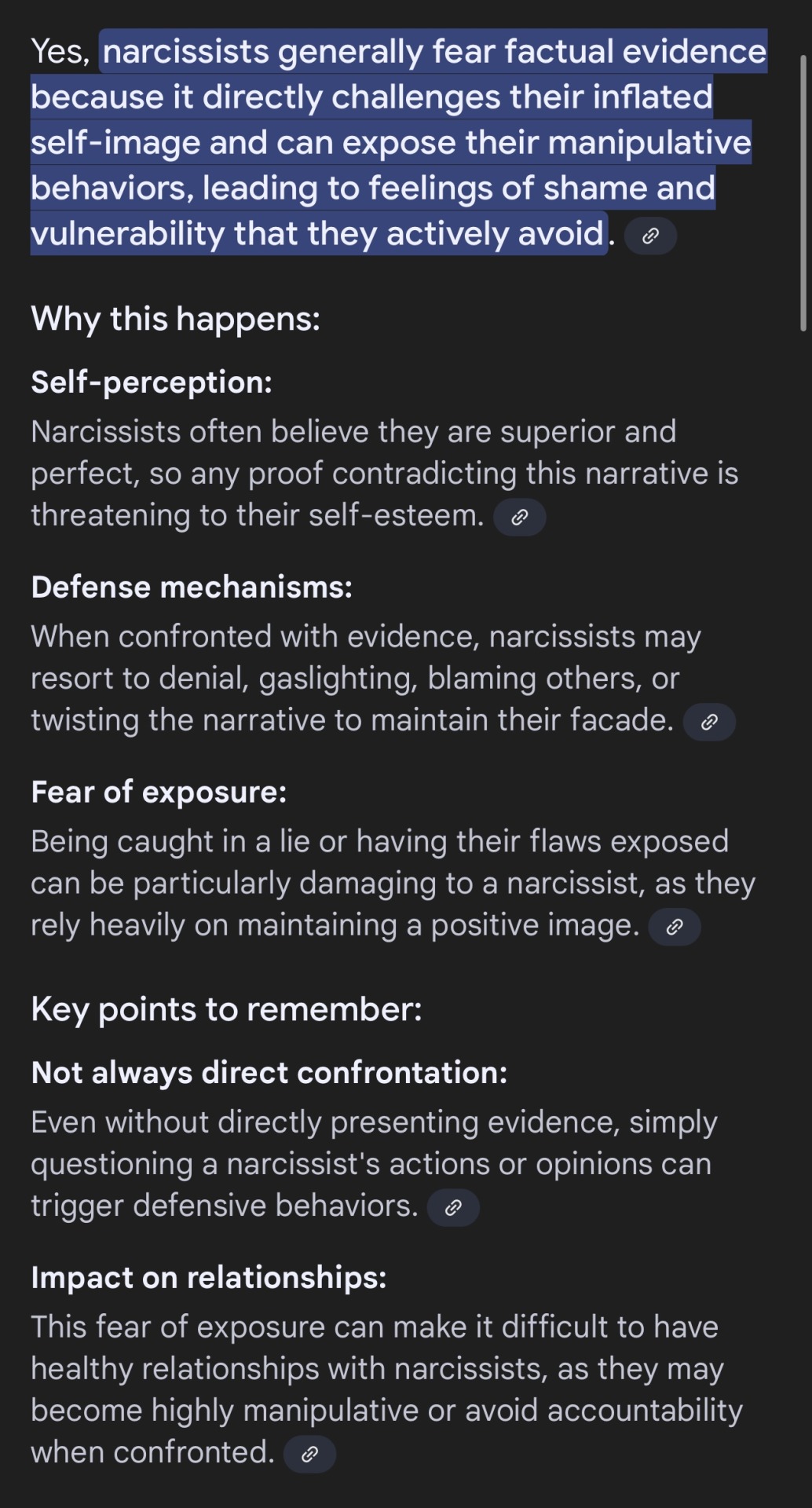
KEY POINTS
* An expectation of special treatment and a deficit in empathy can cause narcissists to seem entitled to forgiveness, even while still harming you.
* For many narcissists, conflict resolution and communication are often games to win, and humility and self-reflexivity are seen as liabilities.
* A narcissist’s terms of forgiveness often rush others into trusting them again, without proof of greater self-awareness or sustained change.
This piece originally appeared in Psychology Today.
That didn’t happen. And if it did, it wasn’t that bad. And if it was, that’s not a big deal. And if it is, that’s not my fault. And if it was, I didn’t mean it. And if I did, you deserved it.”
“A Narcissist’s Prayer,” by Danya Craig, perfectly illustrates why reconciling with a narcissist can feel impossible. When a narcissist asks you to “forgive and forget,” they usually expect forgiveness for harm they are still enacting in real-time. From their vantage point, the problem is you noticing their unwillingness to stop �� not their actual insistence and refusal. They truly believe it would be easier and fairer for you to adjust to their mistreatment, than for them to just stop mistreating you.
Entitlement is a hallmark of narcissisticpersonality disorder. This explains why many narcissists misperceive consequences as more harsh than the cruel, dishonest, and self-centered behavior that warranted such repercussions in the first place. Narcissists see themselves as deserving of special treatment in all circumstances, even if they have destroyed a victim’s physical health, self-esteem, support networks, and capacity to build relationships with trustworthy individuals.
The best apology is changed behavior — that is common sense for most people. Yet, narcissists often prefer that victims adopt denial. They seem unable to imagine that their victims wishforgetting were possible; but the traumainflicted on them was so deep, it is now something they must cope with. And, although it seems counterintuitive, sometimes the best coping looks is not repression, but instead openly processing the trauma with a support system who will not require dissociation from the past or present. Sometimes healing looks like rebuffing toxic amnesia.
As poet Lucille Clifton wrote: “They ask me to remember / but they want me to remember / their memories/and I keep on remembering / mine.”
One might imagine that concrete evidence would help a narcissist understand he magnitude of their harm, but even in the face of proof, many will just pivot to controlling the narrative via victim-playing and “playing dumb.”
They might, for instance, tell others that you started a conflict that actually began with them attacking you, or that you were uncompromising, even though you never asked for anything more than basic respect and remained patient when you still had hope for them to change. Any self-respect from you can intensify this backlash. The more empowered you seem, the more they fear exposure, the more energy they invest in triangulating loved ones and flying monkeys against you, the more time they spend ensuring that their narrative drowns out yours.
Above Consequence and Beyond Reproach
A narcissist’s self-delusion that they are the self-appointed arbiters of truth — and the sole authorities on reality — is the presupposition fueling their entitlement to undeserved trust and respect. Just as narcissists grant themselves permission to shirk the rules and standards they impose on others, they also grant themselves permission to “play God” and rewrite reality to conform to their sense of infallibility.
Relatedly, a narcissist’s eventual downfall usually can be traced to their chronic dismissal of constructive criticism and well-intentioned advice. One might sense the need to sandwich direct critiques — even valid and substantiated ones — with the cushions of affirmative caveats, disclaimers, and qualifiers, or preemptive reassurance that they are a good person with aptitude to improve. Yet, these thoughtful strategies usually prove futile.
Worse still, narcissists tend to project competition and rivalry where neither exist. Advice like, “You might come across more positively if you pause more before you speak,” can easily get misconstrued as, “You think you know everything? That I am dumber than you? That I am a loser?”
Many narcissists could not fathom your openness to learning from them in the next moment, because they feel compelled to project a dominant-subordinate hierarchy onto the dynamic. Their default mental filter is typically set to black-or-white, either-or thinking and false dichotomies (all good-all bad, versus ‘both/and’ perspectives that stresscontextual thinking and moral relativism).
This means they undermine their own socialization, and neglect practicing the prosocial skills of self-regulation and perspective-taking. Even if your private advice would spare them from harsher scrutiny in public, remaining oblivious to the pitfalls of their character may feel safer (and they usually have empath-enablers to help clean up their messes).
Similarly, a group with high collective narcissism — like a religious institution that is authoritarian and doctrinally fundamentalist — might deflect by invoking persecutory delusions, or perhaps overspiritualize any degree of critique or non-conformity as evidence of “The Enemy’s” spirit.
Narcissistic Abuse and Complex PTSD
Narcissists often employ unrelenting tactics — deflection, projection, and rationalization — because they are committed to misunderstanding and discrediting you. Their intent is to overwhelm your nervous system, until you lack the courage and strength to speak up and fight back.
This mind-body impact of this insidious hostility explains why survivors of narcissistic abuse commonly report C-PTSD (complex post-traumatic stress disorder). Walking on eggshells has led to gastro-intestinal issues, inflammation from chronically high levels of stress hormones, disrupted circadian rhythm, nightmares and flashbacks, panic attacks, and more.
In good faith, survivors often attempt reconciliation, not realizing that the narcissist does not “play fair.” Not only that, but entitlement prevents the narcissist from understanding what true peace and forgiveness entail: full transparency, radical humility, and actionable commitments to integrity moving forward, if there is even a desire to do so.
But rarely is humility is rarely found in narcissistic narratives. Thus, healing for survivors of narcissistic abuse often centers the challenge of discarding the need for proof or people to vindicate their innocence and good character.
Typically, the first step looks like replacing an inner self-critic that the narcissist purposely instilled to induce self-consciousness and self-doubt. This inner voice often replays the devaluing script of the narcissist — the narcissist diminishing their strengths, guilt-tripping their confidence or accomplishments, judging what brings them joy, accusing them of selfishness, invalidating their intuition as “craziness,” and comparing them to others.
Re-Traumatization
Once survivors and whistleblowers step forward, narcissists often promise to cease their harm, and perhaps even engage in an ethical reconciliation process; yet, behind closed doors, they are often charming and grooming enablers.
This can be seen in how she and others in their sphere have a group of loud supporters who ONLY allow hatred against me, and praise amongst themselves. A healthy discussion would allow both sides of the argument.
Re-traumatization can result from the trauma of institutional betrayal, or the trauma of being actively and routinely disbelieved, invalidated, silenced, alienated, and/or scapegoated within in a family, workplace or industry, school, religious community, or other institution. Sometimes the re-traumatization of institutional betrayal eclipses the pain of the narcissistic abuse that initially prompted a survivor to speak out.
Institutional betrayal is often enabled by narratives that frame right and wrong “sides,” based on inequitable power dynamics (e.g., “How dare she speak about [her elders, her boss, her pastor, her father, etc.] that way?”). These narratives are how narcissist’s recruit a survivor’s friends and family to deny evidence, surveil them, and socially undermine them through gossip about them being “crazy.”
Survivors eventually realize that, for the narcissist defines “forgiveness” and “peace,” are contingent upon acceptance of their escapist delusions of blamelessness and purity. Nevermind that the revisionist narrative aligned with their self-delusion defies facts, reason, empathy, and all common sense.
Time Is A Mother
In “How to Humiliate an Absolute Narcissist,” Jeremy E. Sherman writes, “Being an absolute narcissist takes discipline of a peculiar kind, the discipline to be completely undisciplined, no consistency in their relentless and bogus rationalizations, the discipline to say in response to everything ‘that proves I’m right,’ with no attention to reality, or the meaning of the things they say, since all that matters is keeping up the appearance of winning.”
Even worse, narcissists often employ what Sherman calls defaulty logic — “if they can find any fault in you, that proves that they are faultless by default.”
This drives them to frame every choice you make as a weakness. Speak out because you feel unsafe? You’re vindictive. Spell out their motives? You’re a know-it-all. Take the high road? You’re uppity. Cry? You’re sensitive. Scream? You’re a monster. Stay silent? You’re scared. Debunk their lies with chronological and detailed evidence? You’re stuck in the past.
You are probably wondering if the narcissist wins in the end. No, they do not. Why, you ask? No liar can stop the truth from accumulating and revealing itself over time. Our character always seeps (or leaps) out eventually, even despite our best concerted effort to blend in and go unnoticed. Shadow work, or examining the unconscious and repressed layers of our selfhood, can save us — yet, narcissists are unequivocally opposed to it.
Imagine spending a lifetime believing your biggest problem is other people, then realizing the implausibility of that projection only when there is no one left to blame.
Narcissists (like Erin and her cult) run smear campaigns in order to shut up their detractor, in hopes of keeping the status quo - control of perceived power.
https://psychcentral.com/disorders/ways-narcissists-smear-others
A narcissist may set out to tarnish your character. Tips, such as documenting interactions and disengaging, can halt the attacks.
A narcissist smear campaign is all about control.
Narcissists don’t like to appear vulnerable or weak. They will often go to great lengths to protect their fragile ego and suppress feelings of shame and insecurity. This may include engaging in a smear campaign to maintain dominance in a relationship or situation.
But you don’t have to fall victim to their scheme. With resilience and strategic thinking, you can protect your reputation, your relationships, and yourself.
What is a narcissist smear campaign?
A narcissist smear campaign is when a person with narcissistic traits or narcissistic personality disorder (NPD) uses manipulative tactics to attack someone’s character. They often do this by spreading false or exaggerated information to:
* mutual friends or acquaintances
* family
* colleagues
* online communities
The narcissist’s goal is to undermine the survivor’s credibility and damage their reputation and relationships. This typically serves to elevate the narcissist’s own status or to retaliate against perceived slights.
Narcissist smear campaign examples
Narcissists may initiate smear campaigns anytime they feel shame or experience a perceived attack. This can manifest differently depending on the context of the relationship.
* Personal relationships: The narcissist may share personal, often distorted information to mutual friends and family. They try to paint themselves as the victim while framing the other person as the antagonist.
* Divorce: During separation or divorce, a narcissist may use accusations of fraud or infidelity. They may also provide false information about an ex-partner’s substance use to make it look like they’re an unfit parent.
* Workplace: A narcissist may attempt to ruin the credibility of an employee or employer in response to being fired, a bad review, or a perceived insult. For example, they may spread rumors about a colleague’s incompetence or dishonesty to discredit them or sabotage their career.
Reasons why narcissists engage in smear campaigns
A narcissist smear campaign has control and self-image at the forefront, says Niloufar Esmaeilpour, founder of Lotus Therapy & Counselling Centre in Vancouver, BC. A narcissist’s fragile self-esteem relies heavily on the perceptions of others, so they use smear campaigns to control how others view both themselves and their victim.
“It also acts as a defense mechanism,” Esmaeilpour says. “If a narcissist feels threatened by someone’s actions, status, or mere presence, they might use a smear campaign to preemptively strike against those who they believe could expose their flaws or criticize them.”
Rachael Dunkel, a licensed clinical professional counselor and certified high-conflict divorce coach in Bozeman, Montana, adds that the intent is to ruin the reputation of the victim.
“This is to ensure the narcissist’s reputation is kept intact or to ensure a reduced risk of loss,” she notes.
How to deal with a narcissist smear campaign
Managing smear campaigns often leads to increased distress and emotional dysregulation. This is often part of the narcissist’s intent, says Dunkel.
“Narcissists want to create imbalances in others, and they will do so by any means,” she notes.
Dunkel adds that smear campaigns may come to an end if it seems as though the narcissistic attacks are ineffective.
Here are some ways to deal with a narcissist smear campaign:
* Maintain your integrity: Don’t retaliate with similar tactics, as this can escalate the situation.
* Disengage: While complete disengagement with a narcissist may not always be possible, it’s best to keep communication to a minimum. Try using the grey rock method of communication, where you don’t show emotion and act indifferent. You could also hire a lawyer to communicate for you, which can help create boundaries and prevent escalation.
* Document: If necessary, keep records of all your interactions with the narcissist to help refute false claims. You may want to communicate only by email, text, or with a third party present.
* Seek support: Build a support network of people who understand the situation and can offer emotional or professional support. In severe cases, legal advice may be necessary to protect your reputation and well-being.
* Protect your physical and mental health: Engage in activities that help regulate your nervous system and heal responses to trauma and threats. This may include practices such as yoga and deep breathing, working with a therapist, or reaching out to safe friends to share your experience.
Erin mentioning her family brings up a good point -
https://www.charliehealth.com/post/is-narcissism-genetic-the-role-of-genetics-in-narcissistic-personality-disorder#:~:text=In%20short:%20Possibly.,over%2050%25%20in%20some%20cases.
Everyone knows someone who thinks a little too highly of themselves and appreciates extra attention. But when a narcissistic personality begins to interfere with an individual’s ability to carry out a normal life, it can fall into the territory of narcissistic personality disorder(NPD)—a personality disorder marked by an exaggerated sense of self-importance, the need for admiration, a lack of empathy, and more.
In addition to disrupting relationships and day-to-day life, an NPD diagnosis can raise questions for family members (just like any mental health or physical health diagnosis). Namely, family members of someone diagnosed with NPD may wonder: Can narcissism be passed down genetically? And genetics aside, what are the other causes of narcissism? Plus, how is NPD diagnosed, and what are the therapies available for the disorder? In this piece, we’ll review these questions and more, getting into the genetic etiology of narcissism and reviewing the different symptoms and treatments for the disorder.
Is narcissism genetic?
In short: Possibly. Several studies from across the world have demonstrated that narcissism is, at least partly, genetic—in fact, according to a couple of studies, the risk of inheriting narcissism is over 50% in some cases.
Narcissism, like other conditions under the behavioral genetics umbrella, is often studied using twins. Identical twins share 100% of their DNA, whereas fraternal twins share 50% of their DNA. If twins, either identical or fraternal, are raised in the same house by the same parents, then researchers can assume that environmental influences are similar and would not cause a trait in one child only. Keeping this in mind, if a trait is shared in identical twins (which happens more frequently than in fraternal twins) and the environment is controlled, researchers can then hypothesize that the trait in question has more of a genetic basis.
As an example, reading disabilities like dyslexia have a strong genetic component. Therefore, we are more likely to see dyslexia in both individuals who are in a set of identical twins as compared to two individuals who are fraternal twins. If both identical twins in question live at home with the same set of parents, we can assume that parental influences such as early reading structural support did not create an outcome in one child that was not seen in the other. This same logic is applied in studies of narcissism.
Let’s review three twin studies related to narcissism:
1. One of the earliest and most cited research studies on twins relating to personality traits was published in 1996 by a team of researchers from Canada. The team assessed 483 volunteer twin pairs, 236 being identical and 247 being fraternal. Each individual was asked to complete a questionnaire at home alone. The questionnaire called the Differential Questionnaire (DAPP-DQ), had 560 questions that asked about a person’s personality. In this study, by comparing the fraternal and identical twins, narcissism got a heritability score of 53%. This means that researchers believed that genetics accounted for 53% of narcissism in these individuals.
2. A large study in Norway involving over 3,000 sets of twins examining personality disorders and their genetic basis was published in 2008. All 10 personality disorders listed in the Diagnostics and Statistical Manual of Mental Disorders Fourth Edition (DSM-IV)—the manual used by mental health professionals to diagnose mental health conditions—were included. In this study, modeling of the twin data led researchers to believe that about 33% of narcissism disorder has a genetic basis, while the rest was caused by environmental influence.
3. In 2007, a study examining participants from the United States and Canada studied the genetic component of the “Dark Triad,” a group of three personality traits, including narcissism, Machiavellianism, and sub-clinical psychopathy, in 139 pairs of twins. After looking at identical and fraternal twins, researchers determined that the genetic effect on narcissism was 59%.
These studies reveal that there is likely a genetic component to narcissism, but it’s unclear exactly how big or small that genetic effect is—an outcome that’s consistent with other studies on personality disorders, which are notoriously hard to quantify scientifically. While the findings of the NPD studies are statistically significant (especially given the number of participants involved), the results are still hard to interpret because the studies use different metrics (different questionnaires and different mathematical regressions to interpret the data). In order to more definitively determine the genetic etiology of NPD, there need to be more studies on this topic that more closely replicate each other’s numbers.
If I have a parent with narcissistic personality disorder, will I have it too?
In short: Not necessarily. While narcissism can be attributed in part to genetics, it is difficult to assess how big of a role genetics plays, and this is seen by the range of numbers reported by the studies above.
We do not yet have a specific number or percentage we can point to in determining how important genetics are in the diagnosis of NPD. Further research into this field, even looking into specific genes related to narcissism, is underway and is needed to better understand the genetic etiology of NPD.
https://my.clevelandclinic.org/health/diseases/9742-narcissistic-personality-disorder
People with NPD often have subtle differences in brain structure, but experts aren’t sure if that’s what causes NPD or happens because of NPD.
For now, the main contributing factors to NPD seem to be:
* Genetics. People with NPD are more likely to have parents or close relatives with it.
* Observation and imitation. Children can observe, imitate and learn traits and behaviors that can develop into NPD.
*
* Culture. Research indicates that the culture you grow up in can influence your risk of developing NPD. The risk seems to be higher in cultures where individualism and personal independence are more encouraged. People who grow up in cultures that encourage a sense of community and collective action are less likely to develop NPD.
Access past postings in this directory!

#Nirmal's TED Talks LOL#thomas and friends#thomas the tank engine#trains#ttte#steam engine#steam locomotive#train#actually narcissistic#narcissistic traits#narcissism#white knight#gatekeeper#gaslighting
0 notes
Text
NEW VIDEO Why Narcissist Desires YOU, Why YOU Fall for It (Conation, Doxastic Voluntarism, Base Rate Fallacy)
youtube
Watch 1400+ Videos about narcissists, psychopaths, and abuse in relationships - click on this link to visit my channel:
Counselling with Sam Vaknin, or Lidija Rangelovska, or both of us - click on this link:
NEW! Amazon Malignant Self-Love: Narcissism Revisited FULL TEXT, 10th EDITION
https://www.amazon.com/dp/1983208175 (US)
https://www.amazon.co.uk/dp/1983208175 (UK)
Find and Buy MOST of my BOOKS and eBOOKS in my Amazon Store: https://www.amazon.com/stores/page/60F8EC8A-5812-4007-9F2C-DFA02EA713B3
Abused? Stalked? Harassed? Victimized? Afraid? Confused? Need HELP? DO SOMETHING ABOUT IT! You OWE IT to yourself and to YOUR LOVED ONES! Save $63!!!
BUY SIXTEEN e-books about toxic relationships with narcissists and psychopaths - and get the PDF versions of ALL 16 books plus a huge bonus pack FREE!
Click on either of these links and send the proof of purchase via email to [email protected] to receive the PDFs and Bonus Pack:https://www.amazon.com/dp/B07FK6316T
Copies SIGNED and DEDICATED by the Author, Sam Vaknin (use only this link!): http://www.amazon.com/gp/product/8023833847/ref=cm_sw_r_tw_myi?m=A2IY3GUWWKHV9B Everything You Need to Know about Narcissists, Psychopaths, and Abuse - click on this link: http://www.narcissistic-abuse.com/faq1.html
Kindle Books about Narcissists, Psychopaths, and Abusive Relationships - click on these links:
http://www.amazon.com/s/ref=ntt_athr_dp_sr_1?_encoding=UTF8&field-author=Sam%20Vaknin&search-alias=digital-text&sort=relevancerank (Amazon USA)
http://www.amazon.co.uk/s/ref=ntt_athr_dp_sr_1?_encoding=UTF8&field-author=Sam%20Vaknin&search-alias=digital-text&sort=relevancerank (Amazon UK)
The BIBLE of NARCISSISM Malignant Self-love: Narcissism Revisited - CLICK ON THIS LINK TO PURCHASE THE PRINT EDITION:
From Amazon: http://www.amazon.com/Malignant-Self-Love-Narcissism-Sam-Vaknin/dp/8023833847/
100% of the text of "Malignant Self-love" (730 pages) - at 40% the price! 100% of the tips, advice, and knowledge - at less than HALF the cost!!!
Buy the e-book instead of the print edition - click on these links:
http://www.amazon.com/Malignant-Self-love-Narcissism-Revisited-FULL-ebook/dp/B00HDJF7HC/ (Amazon USA)
http://www.amazon.co.uk/Malignant-Self-love-Narcissism-Revisited-FULL-ebook/dp/B00HDJF7HC/ (Amazon UK)
NEW e-BOOK "How to Divorce a Narcissist or a Psychopath" - Click on this link now: https://www.amazon.com/dp/B00759NMQ8
NEW e-BOOK "Personality Disorders Revisited" - Click on this link now: https://www.amazon.com/dp/B00708SLRE
NEW e-BOOK How to Cope with Narcissistic and Psychopathic Abusers and Stalkers
0 notes
Text
Idle Thoughts 8
Why would you speak about a person's heritage and family and bring it into question if you do not know them and have never met them in person? You don't know their family, direct or extended. Certainly, you can speak to people adjacent to them, but it still does not mean you have definitive information on their family history. You cannot make conclusive statements about their heritage as an outside observer.
If you do not know an individual's personal account or history with drug use or addiction, why would you try to speak over them about these matters? You do not know from firsthand information how their life or the lives of people around them were impacted, so you cannot claim to know whether or not they're lying.
Did you know this person and their life history personally? Have you known them through periods of time when they were younger? No? Then why do you claim they could not have possibly been homeless at one point? You weren't there. You don't know. You can claim you know a friend of a friend who knows one thing or another, but you do not know through firsthand accounts. In addition, homelessness takes many forms. People can still have access to the internet and social media, but still be homeless.
Do you know with 100% certainty that an anonymous comment or message was made by a person? How do you know? Assuming it's a specific person based solely on "speech patterns" is fallacious: you are not as adept at interpreting patterns in dialogue as you think you are. You are simply looking for patterns that you expect to see rather than observe what is actually before you. Without solid, undeniable evidence that involves real data rather than extrapolation from what you personally believe are patterns, you don't know anything.
Do you know exactly the context of every conversation a person has had with others? No? Then why are you dissecting snippets of dialogue, drawing conclusions from barely any conjecture to paint a picture of malice? You do not know the full history of dialogue between groups of individuals that you do not know anything about. You do not have access to this information. You are merely taking snapshots of information and crafting a narrative.
Do you know a stranger's full medical history, having never met them in-person once in your life, nor do you have any direct connections to people and family immediately around them? No? Then why do you make such audacious claims to know whether or not they have had an illness or not? You claim an individual is lying about having illnesses or medical conditions, with your evidence being…. nothing. You don't know them. You don't know them on a personal basis enough to really know what medical history they've had. You cannot wholeheartedly proclaim your opinion as truth when you have no evidence to support your words.
Do you know the complete educational history of this person, including where they went to school, when they went to school, and have access to their school records? No? Then why do you claim to know the extent of their education and degree (or lack thereof) if you don't actually know their educational history personally? You don't know this individual personally. You don't know where they went to school. When they went to school. What they went to school for. If you don't know these things, then no number of proclamations or collecting text-based messages can ever lend any credence to your claims.
You can claim many things. You can use all the anecdotal evidence you wish; however it does not change the fact that it is still thus: anecdotal. Unreliable. Informal, and lacking any irrefutable proof. You can tell others that you have proof. You make long essays, you post screenshots, you link a post or two. But at the end of the day, you do not know this person. You have only scratched the surface of an online persona whilst having no meaningful evidence to support your own words.
The longest, most in-depth analyses of these posts are flawed; you are still operating under the notion that anecdotal evidence is evidence at all.
It is not.
What you believe and what is actually true are mutually exclusive.
If you do not know an individual personally, you cannot make broad claims about their family history, their livelihood, their residence, their education, their medical history. You can draw conjecture all you wish, though it will not ever change the fact that you truly do not know for certain.
Pretending otherwise is dishonest and revealing of the true nature of the claims: an effort by which to slander the character and credibility of another.
To those who take a more critical look at the situation, it is clear that there are no hard pieces of evidence through which you are using to discredit another. There is only the facetious use of anecdotes and conjecture drawn from small fragments of information you piece together in whatever method suits your story the best. An intentional framing of dialogue, text, or video, all pieces of media that show an insignificantly small portion of an individual's true self and tie them together in such a manner as to present a case that you see fit to.
All humans have a bias in their work, whether they are aware of such or not. Yours are worn proudly on your sleeves: you intentionally seek out controversy, lies, and deceit, and thus it is all you will ever see.
To slander another with an excess of words and links to others' anecdotes to bolster your own faux credibility is doable by anyone and to anyone, of course. If you have enough pieces of many different puzzles, you'll eventually be able to force them to fit together and make whatever image you choose to create.
Whether you do or not, however, will demonstrate whether your sense of morality is skewed.
If you do not know an individual on a personal basis, how can you possibly claim to know so much about them?
You do not.
Humans are not perfect beings: far from it. I can empathize with people who have been personally harmed by an individual. Who've maybe been verbally abused, lashed-out at, or otherwise made to feel uncomfortable, unsafe, or unwelcome. Such behavior is unacceptable, and I encourage people to speak out against it as such.
No one individual should need suffer through harm, and people are correct in defending themselves from it.
But a line must be drawn between protecting oneself from verbal altercations, and the malicious spread of misinformation based on anecdotal evidence.
By all means, relay information about personal one-on-one interactions you may have with someone, but to cruelly claim falsehood and lies over facts you have no capacity to know with certainty is far more damaging in the online ecosystem.
0 notes
Text
Leading Designs in Laminate Flooring for Modern Interior Design
Floors have a extensive impact on how a place feels and looks usual, so they ought to be considered even as remodeling your property. Laminate floors are the various maximum nicely-preferred substitutes for cutting-edge interiors. Laminate flooring has superior drastically in phrases of recognition and creativity. It is well-known for its durability, affordability, and ability to mimic herbal materials like stone and wooden.
If you're thinking about updating your flooring, it's crucial to live on pinnacle of the contemporary developments in laminate flooring to ensure your area feels sparkling and up to date. In this text, we are able to discover the top developments which might be making laminate floors the cross-to desire for modern houses.
1. Realistic Wood and Stone Textures
Laminate floors has evolved significantly over time. Today’s designs are nearly indistinguishable from real wooden or stone, way to advanced era. The excessive-definition imaging used in the manufacturing of laminate flooring creates exceedingly realistic textures, making it a super alternative to natural substances. Homeowners can now revel in the appearance of hardwood or stone at a fraction of the rate.
This fashion is especially appealing for those who love the country or business appearance, as laminate flooring can mimic the grain styles of oak, pine, or walnut and the rugged look of slate or marble. The realistic feel underfoot and the added durability make it a brilliant option for busy families.
2. Wide Planks for a Spacious Look
Wide plank laminate floors is becoming a hot trend in modern interiors. The large floor of wide planks makes rooms seem larger and more open, a key feature for present day domestic designs. Whether you're operating with a compact space or an expansive place, wide plank flooring adds an detail of luxurious and spaciousness.
Traditional wooden floors typically makes use of slender planks, however wide plank laminate floors creates a extra current, sleek appearance. It additionally calls for fewer seams, which contributes to a smoother, cleaner appearance. This is specially popular in open-plan residing regions, where continuity and float are important.
Three. Herringbone and Chevron Patterns
Patterned laminate flooring is any other trend it's gaining traction, particularly using herringbone and chevron designs. These patterns provide a fashionable twist to conventional wood ground looks, and now they may be being recreated in laminate for a fragment of the fee.
The geometric attraction of herringbone and chevron patterns provides sophistication and visible interest to any space, making them ideal for residing rooms, hallways, or eating areas. These patterns also assist in making smaller rooms seem more dynamic and layered, presenting a conventional but modern-day sense.
4. Waterproof and Water-Resistant Laminate Flooring
The improvement of water resistant and water-proof laminate floors alternatives is one among the biggest enhancements. Laminate flooring used to have a horrific popularity for purchasing effortlessly moist, which made it fallacious for areas like basements, baths, and kitchens. However, with new water resistant and waterproof laminate flooring alternatives, you could now set up laminate in the course of your house with out disturbing about water harm.
This improvement has unfolded an entire new realm of opportunities, especially for owners who want the continuity of getting the identical flooring throughout their home with out sacrificing practicality. Waterproof laminate is also a first rate option for households with youngsters or pets, wherein spills and messes are a commonplace occurrence.
Five. Matte Finishes for a Natural Look
Shiny, sleek flooring are out, and matte finishes are in. Modern laminate floors tendencies favor a more herbal, understated look. Matte finishes supply the arrival of uncooked, untreated timber, adding an natural, earthy feel to the distance.
This fashion aligns with the broader motion towards minimalism and herbal aesthetics in home design. Matte laminate flooring doesn’t display smudges or dust as easily as sleek finishes, making it a sensible choice for busy families. The subtle, low-sheen look additionally pairs properly with a extensive variety of indoors design styles, from Scandinavian-stimulated houses to industrial lofts.
6. Gray and Whitewashed Tones
Neutral tones have continually been a staple in modern indoors layout, and gray laminate floors has emerge as a favorite amongst homeowners. The cool, muted tones of gray laminate flooring work superbly with present day designs, providing a flexible base that may supplement a whole lot of shade schemes.
Whitewashed laminate flooring is likewise trending, especially in coastal and minimalist interiors. The light, ethereal sense of whitewashed wooden-look laminate creates a serene ecosystem, making areas sense larger and greater open. Both gray and whitewashed floors provide a contemporary, easy backdrop that allows different design factors inside the room, like fixtures and décor, to shine.
7. Textured and Hand-Scraped Finishes
Adding texture to laminate floors is an rising fashion that gives a extra true, tactile enjoy. Textured or hand-scraped finishes mimic the imperfections and grooves observed in actual hardwood floors, developing a worn, vintage appearance that adds man or woman to your property.
This type of laminate flooring is perfect for folks that want a ground that looks elderly or reclaimed but still want the sturdiness and simplicity of protection that laminate offers. The textures no longer only decorate the visible appeal of the floor but additionally make it greater resistant to scuffs and scratches, that is amazing for excessive-traffic areas.
8. Sustainability in Laminate Flooring
The call for for green laminate flooring is rising as sustainability becomes more and more vital to households. Presently, severa manufacturers provide laminate flooring made from recycled substances or rent eco-friendly production methods.
Additionally, laminate floors uses much less natural wooden as compared to traditional hardwood floors, making it a extra sustainable choice for the ones seeking to lessen their environmental impact. This fashion appeals to eco-aware clients who want beautiful floors without compromising on their inexperienced values.
9. Easy Installation and DIY-Friendly Options
One of the main reasons laminate floors remains popular is its ease of installation. Many cutting-edge laminate floors include a click-lock system, allowing homeowners to put in their flooring with out expert help. This DIY-pleasant fashion saves both money and time, making it perfect for those looking to update their houses on a price range.
Floating floors, where the laminate isn’t glued or nailed down, are particularly popular due to the fact they can be set up over maximum current flooring kinds, making renovations short and problem-free.
Conclusion
Laminate floors is usually evolving, offering homeowners more alternatives than ever before in terms of fashion, capability, and affordability. Whether you are attracted to the practical wooden textures, water-proof residences, or contemporary matte finishes, there is a laminate flooring fashion to suit every taste and way of life. As you take into account updating your property, maintain these trends in mind to make certain your indoors design is each fashionable and sensible.
Investing in laminate flooring isn't simplest a finances-pleasant desire but additionally a smart one for those who need to preserve their homes looking contemporary and welcoming for years yet to come.
0 notes
Text
06. How history informs present
"People must know the past to understand the present, and to face the future" - Nellie L. McClung
"There is no peculiar merit in ancient things, but there is merit in integrity, and integrity entails the keeping together of the parts of any whole, and if these parts are scattered throughout time, then the maintenance of integrity entails a knowledge, a memory, of ancient things. …. To think, feel or act as though the past is done with, is equivalent to believing that a railway station through which our train has just passed, only existed for as long as our train was in it."
(Edward Hyams, Chapter 7, The Gifts of Interpretation)
Initial Thoughts:
Both these quotes, essentially, have the same core message; acknowledging and understanding the past is vital to maintaining our present conditions effectively. Our lives now are the result of an accumulation of past decisions, the choice our ancestors made to migrate or to settle determined where we ended up, who they married informed our genetics and the careers they chose laid the foundation for our socio-economic lives. While these circumstances are in the past, they happened and we are living proof of their affects, they demand to be recognized. As Hyams puts it, "To think, feel or act as though the past is done with, is equivalent to believing that a railway station through which our train has just passed, only existed for as long as our train was in it", its absurd to dismiss the past because one believes it no longer directly influences them, consequences of the past continues to trickle down and shape the world around us.
While knowing our personal history is important in acknowledging where we as individuals (and families) came from, for communities it is a necessary step to sustainable practices.
History through Oral Tradition:
Oral tradition like all methods of teaching imparts cumulative information from generation to generation, with the difference lying in the fact that oral tradition only utilizes the use of spoken language rather than written text to communicate knowledge.
This ancient practice seen around the world allows for interpretation and contextualization through storytelling which essentially offers insight into the motivations, beliefs, and values of previous generations. Elders are able to pass down knowledge gained from lived experiences, offering guidance and insights that inform present-day decision-making and behavior. By engaging with oral traditions, individuals can learn from the successes and failures of past generations and apply these lessons to navigate present day challenges and opportunities.
The Development of Medicine:
Another invaluable way of utilizing the history and progression of knowledge is studying the development of medical sciences. The medical field has developed extensively over the centuries and has taught us valuable lessons for informing future endeavors in healthcare. By understanding disease patterns, learning from past medical practices, addressing ethical considerations, leveraging technological advancements, and addressing social determinants of health, we can improve healthcare outcomes and ensure patient safety in the future. Historical knowledge helps us avoid past mistakes, innovate responsibly, and address systemic barriers to equitable healthcare delivery.
Bottomline, past decisions and actions continue to reverberate through time, shaping our current circumstances and influencing our lived experiences. Hyams' analogy of the railway station effectively illustrates the fallacy of viewing the past as disconnected from the present, emphasizing the ongoing relevance and significance of historical events and legacies.
0 notes
Text
I made an attempt to oblige the uploaders on germ theory on BitChute, but then I inevitably realized the act of actually getting to solid arguments one way or another in this shit-flinging was actually beyond the pale.
I remember, at some point, I made the statement that the way lefties expect people to make sense according to *their* thoughts, like the women that will divorce-rape you because they get the "ick", that expectation has nothing to do with the amount of effort applied.
So? Then I look at something in reality, and I realize there really *isn't* any merit in going beyond the pale of their expectations, because all these people are doing anyway is what comes down to repeated ad hominem arguments based in strawmen fallacies that they're making simply because they "have" their theory concluded in their minds in advance. If this is what is considered getting the job done intellectually, it's no wonder nothing ever gets done anymore in the workforce either. No, our problem runs *deeper* than the dropout crisis. Men don't know how to work. Our sense of satisfaction comes from this sense of being "right", which exists on essentially a virtual plane that doesn't exist.
If we had a solid argument in all that, the uploader would still be full of shit.
The current standings on the science are that it doesn't matter whether you're of the establishment or not: everyone, *everyone* finishes their argument by painting in broad strokes that every disease is categorized as *their* label, with no proof - with anti-germ-theory conspiracy theorists, it's awkwardly that they're "toxins" or "venom", which makes *no* sense because that awkwardness gives people the "ick", so to speak, setting off an entire tirade of pro-establishment wall-of-text. The scientific establishment itself has it established so that every disease, when you simply look it up, will be categorized as bacteria because it is made default. So on both ends, no effort or actualization is involved. The scientific method be damned. We're not living in a first-world country - when you step outside the bounds of what they'll teach you within standardized curriculum, it's like venturing outside your whitewashed neighborhood into what Kanye has dubbed "the Black Mass". "Astronauts Gone Wild" is thereby par for the course and then some, as you see these people catching things on fire flipping cars over every now and then for no reason or stimulus other than that some headcanon of the value of the ad hominem strawmen described got violated, and they're very angry. In reality, life doesn't have the intrinsic value to get all uppity about it. The average IQ is only 100, in the end. So aside from regurgitation-level understanding of what your curriculum teaches you at face value, what, you can play with Tinker Toys?
So basically - especially when they're lodged in a bureaucratic position in an institution that's deemed "too big to fail", humans aren't worth their salt - so you should not pay taxes. But this laziness doesn't even require the existence of an institution in the first place. The sense that they are right in a way that morally removes them from the fault of the flock suffices, so that the uploader will no longer feel the need to build their theory from the ground up to qualify it. You *might* find the meat of the argument in there, but there's no push toward it.
How it goes "Please prove that diseases etc. are either venom/toxin or bacteria"
"*Sorry*, I was already on course to just sit here and keep flapping my gums for another few hours until *another* set of tangents crop up" ( - then, for people that I actually am there with in person, then they finish and look around like everything's resolved, and I have to make my question from zero again, and then maybe they're like "*oh!*")
I don't know how to diagnose this except from what I heard from a Christian book, that people of modernity have lost their touch of what it means to be in an intimate environment - they seek after attraction after attraction like tourists
0 notes
Text
Gosh sometimes I see people on this site say things on behalf of Christians pertaining to what we believe that are just so utterly wrong and contrary to the Bible and get deeply exhausted
#It’s called a straw man friend and it’s a logical fallacy ✌🏼#The hardest parts are that#you can’t correct them without being accused of hijacking a post#and also they probably got it from some super skewed church that only uses proof texts without context
0 notes
Text
I can see why some people think Disco Elysium is almost advocating pro communism and it the most sympathetic ideology there for sure.
But it seems to me that they miss the part when the game says "hey communism is kinda cool but it cannot really work". Because the game criticise every single ideology.
It does not use any of logical fallacies to make fun of them. It takes their problematic aspects and exaggerates their ingame versions to the comical extreme. To the point whem its impossible to overlook certain problematic aspects.

And there is lots of belief and good will and paintings of idealistic future in the communism as it is presented to us, yes. But there is little to no believable explanation of how to achieve any of it because it will not build itself on our faith alone. (just through Harry we can say so many lines like *let's start building communism" and "power to the working class" but there's no way to follow up on them, they are just empty words.)
And of course then there is also contrast of the ideology as it is presented to us in its manifest (very idealistic with no instructions or proofs and only theories), ideology as it was practiced in the past (Kras Mazov and his not very peaceful revolution) and ideology as it is practiced today (Intellectuals and elitists interested only in debating refusing any criticism).
Now of course we don't know how are we supposed to interpret the text of the game and everyone is entitled to have their own interpretation but especially this part for me just says: Communism has just one little flaw and that is that outside of theory it does not work.
#I tried to be brief here but I have lots of thoughts about communism in Disco Elysium#disco elysium#disco elysium meta#disco elysium analysis#disco elysium ideologies#mEye post
30 notes
·
View notes